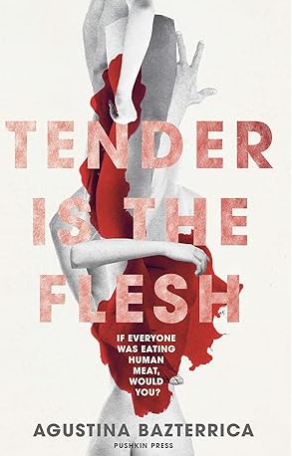
For all things fantasy, horror, and speculative fiction
Review Details
Review type: Book
Title: Tender is the Flesh
Author: Agustina Bazterrica
Publisher: Pushkin Press
Release date: 6th February 2020

Reviewed by: Sarah Deeming
Other details: Paperback RRP £9.99
Tender is the Flesh by Agustina Bazterrica
Book Review
Sarah Deeming
A virus has developed in animals that is deadly to humans. One scratch is enough to kill someone, and eating meat is impossible. To protect the human race, all animals, even household pets, have been exterminated, and veganism seems to be humanity’s only option. Or is it?
Marcos is a plant manager at a slaughterhouse for humans, referred to as “headsâ€, preparing farmed “meat†for sale in butchers and supermarkets. Every day, heads are bought to the plant from farmers, and every part of them is used. No part of the special meat goes to waste. Even the skin is used as a leather substitute. Marcos has worked in this industry for so long that he doesn’t even see them as people anymore until one day, he is given a premium-grade female as a gift. At first, she is just a problem to deal with at a later date, but the more Marcos tends to her needs, the more she haunts him when he’s not with her. Her trusting eyes, her scent, her trembling body. She reminds Marcos of a gentler time, and he starts to ask if this hard world, where man literally devours his fellow man, is beyond redemption.
Tender is the Flesh is a very thought-provoking book that is not for the faint-hearted. On the surface, it is a post-apocalyptic story about legal cannibalism and how people have adapted to this new reality. A deeper read reveals that it is an examination of the food chain and how livestock is treated, and an even closer look shows it explores the power of consumerism, pitting the haves against the have-nots.
The story is told in the third person, present tense, from Marcos’s point of view as he goes through his day-to-day life at the processing plant and the usual family problems a husband/father/son would have. That, in itself, is a compelling story of how Marcos navigates caring for his elderly father while managing his job. Throughout, there are hard reminders of how animals in the food chain are treated. Marcos walks two job applicants through the plant from the “headsâ€, the name used to describe the men and women brought to the slaughterhouse, arriving at the factory to the special meat being packaged and sent out to butchers.
Although there are very graphic descriptions of rape, abuse, murder and animal cruelty, it is not glorified. If that had been the case, I would not have finished it. However, Marcos is so world weary and agitated that he is disgusted with the ease with which the people around him consume human flesh as if it were beef or pork. There is a particularly grim scene where hunters are sitting after a full day hunting on a game reserve, enjoying their kills. What have they hunted if there are no animals left? Other human beings, of course. Most are from the farms, men or pregnant women (because they are more ferocious than non-pregnant females), but there is the odd celebrity who has fallen on hard times and so enters the reserve on the promise of a massive payout if they survive. One of the hunters has bagged a celebrity, and this makes for a very distasteful conversation where this onetime famous human is reduced to bad jokes about his penis size. Like I said, this is not for those of a nervous disposition.
But this scene, graphic as it is, takes us to the next level of meaning as the hunters reduce their fellow man to a leisure activity. I found it hard because we do this now. We might not physically consume our fellow man in this sense, but when we buy cheap, fast fashion, we know there is a human cost, that someone has worked for long hours and minimal pay to make a t-shirt we will probably only wear for one season.
The story moves along at a steady pace and is cleverly written. Bazterrica has thought about where milk now comes from, what happens to people who die naturally and how families prevent their loved ones from entering the food chain. Among the brutal scenes, there were moments of tenderness which show society is not completely without redemption, giving your brain a much-needed break from the cruelty of it all. And Marcos isn’t the only person struggling with the prospect of eating other people. I devoured the book in one sitting, was knocked sideways by the ending and was left shell-shocked when I put the book down. It’s hard to say I enjoyed a book like this, but weirdly, I did. Tender is the Flesh forced me to pay attention rather than mindlessly consume it. I would recommend this, but I would add a note of caution that the level of violence and torture may be too much for everyone.
Tags: Cautionary TaleContemporary FantasyHorrorTranslation
Category: Book Review
All reviews
Latest Reviews:
- The Flesh King by Richard Kadrey
- The Haunted Vintage Marjorie Bowen
- Daughters of Nicnevin by Shona Kinsella
- Katabasis by R. F. Kuang
- Opposite World by Elizabeth Anne Martins
- The Mad Butterfly’s Ball Ed by Preston Grassm & Chris Kelso
- House of the Beast by Michelle Wong
- Born of an Iron Storm by Anthony Ryan
- Call of Cthulhu: The Sutra of Pale Leaves 2 – Carcosa Manifest
- Call of Cthulhu: The Sutra of Pale Leaves – Twin Suns Rising
Review tags:
Action (48) Adventure (69) Angry Robot Books (11) Contemporary Fantasy (14) Fantasy (114) Folklore (10) Gothic Horror (12) Harper Voyager (12) Historical Fantasy (14) Horror (69) Orbit Books (33) Romance (27) Science Fiction (34) Titan Books (35) TorDotCom (12)
Leave a Reply